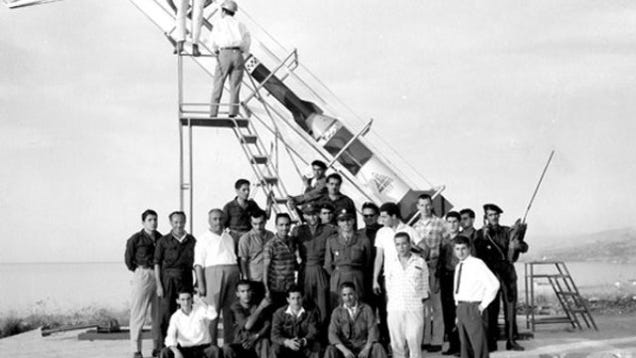ComradeHuxley
Donor
In the early 1960s, some twenty-something enthusiasts in Lebanon started building remarkably sophisticated rockets. These rockets made it as far up as the International Space Station is today, and even the United States and Soviet Union had to pay attention.
The Lebanese Rocket Society was the brainchild of Manoug Manougian, a 25-year-old math and physics lecturer who in 1960 was teaching at Beirut's Haigazian College. Deeply fascinated with rockets, he enlisted some students who shared his love and together they started building the things. They weren't just playing around with models - using a student's family farm, the newly formed society set up shop and started experimenting with various solid rocket fuels.

The first successful launch came in April 1961. By this point, the Lebanese military was a part of the proceedings, and observers from the "official" competitors in the Space Race, the US and the Soviet Union, were on hand to watch. This initial success reached a maximum altitude of about one kilometer.
The Society then pulled off a bunch of increasingly impressive launches, ultimately reaching roughly 145 kilometers up into the thermosphere, the part of the upper atmosphere where the International Space Station orbits today. That altitude measures up quite respectably to the 187 kilometers reached by Alan Shepherd in Freedom 7, the United States's first manned foray into space. Of course, Lebanon never reached the point of putting astronauts inside its rockets, but that doesn't detract much from the incredible engineering acumen demonstrated by the Lebanese Rocket Society.
Unfortunately, the political climate of the time was not conducive to their rocketry experiments. Lebanon was not disconnected from the various political strifes that affected the reason, and French President Charles De Gaulle reportedly counselled Lebanon President Fouad Chehab to abandon their research into rocketry and missiles, lest it attract unwanted attention from those who feared the military applications of the work. The Rocket Society disbanded in 1966, and the entire project languished forgotten in obscurity.
Lebanon was the forgotten player in the sixties space race
Alasdair Wilkins
What would have been the non ASB best case for their programm? What if they, metaphorically speaking, had consistently thrown sixes?